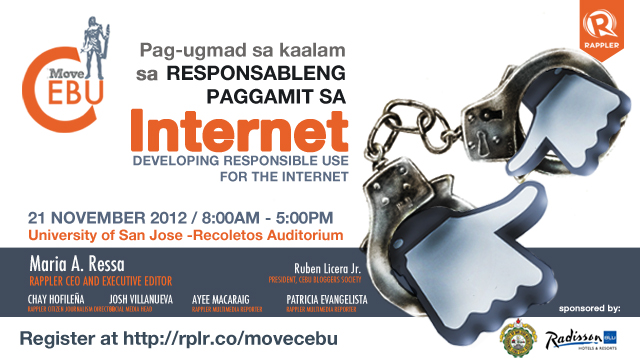Posted on 11/19/2012 2:04 AM ?|?Updated 11/19/2012 6:55 AM

 Share
Share 
MANILA, Philippines - When the Cybercrime Prevention Act or RA 10175 was signed into law on September 12, it unleashed a torrent of strong condemnation from members of the media, civil society, and even some politicians -- in spite of attempts to defend the law.
Critics argued for its immediate repeal or revision, calling the law an assault on freedom of expression and a throwback to the martial-law era. Chief among the contentious provisions of the law are section 4(c) on online libel and section 19 that allows the government to restrict data access.
A campaign to repeal it began online through social networking sites and blogs, but with no clear leader or unified position. Its reach extended throughout the country and took on a life of its own, culminating in the filing before the Supreme Court of several petitions for its immediate suspension.
On October 9, the Supreme Court issued a temporary restraining order valid for 120 days, effectively placing RA 10175 in the judicial equivalent of limbo.
While the High Court is not known to kowtow to public opinion, many claimed the TRO as a victory for millions of Filipino netizens.
Once again, online social media helped call attention to a pressing issue and galvanized many to voice their opinions for or against the law. This reflects the increasing leverage social media has to shape the future.
Changing landscape
Social networks are no longer just venues for interaction. They have become tools for information dissemination, behavioral change, and most importantly social change.
This leveraging power is what inspired Rappler to create its chat series dubbed ?Social Media for Social Change.?
The chat series -- previously held in Baguio, Davao, Manila, Naga, Cagayan de Oro, Zamboanga, Los Ba?os, and Dumaguete -- are organized by Move.PH, Rappler's citizen journalism arm. A recent chat session scheduled in Bacolod was cancelled because of an earthquake.
Rappler is driven by journalists committed to informing Filipinos and inspiring them to engage in nation-building by providing a credible, creative, and interactive platform through social media.
#MoveCebu
Cebu is the next stop of Rappler's Move.PH Chat Series.
The University of San Jose-Recoletos, through its College of Arts and Sciences, is co-sponsoring the event subtitled, ?Pag-ugmad sa Kaalam sa Responsableng Paggamit sa Internet? (Developing Responsible Use of the Internet) on Wednesday, November 21, from 8:00 am to 3:00 pm at the USJ-R Auditorium (main campus).
Rappler CEO and executive editor Maria Ressa will headline the event with her keynote address about the power of social media and how it can bring about social change.
Ruben Licera, President of the Cebu Bloggers Association, will talk about the Cybercrime Prevention Law and how it affects social media.
Veteran journalist and Rappler's citizen journalism director Chay Hofile?a will tackle the ethics of journalism in the digital age.
Journalist Ayee Macaraig will share the many challenges of being a multimedia reporter.
Rappler social media head Michael Josh Villanueva will discuss how social media platforms can be used to leverage youth advocacies.
Finally, Patricia Evangelista, Rappler multimedia reporter, will talk about the importance of telling compelling stories.
The Cebu leg of the chat series is sponsored by Radisson Blu Hotel Cebu. - Rappler.com
Register online for #MoveCebu:
Source: http://www.rappler.com/move-ph/16360-movecebu-social-media-for-social-change
colbert report legionnaires disease underwear bomber unclaimed money godspell media matters hana
No comments:
Post a Comment
Note: Only a member of this blog may post a comment.